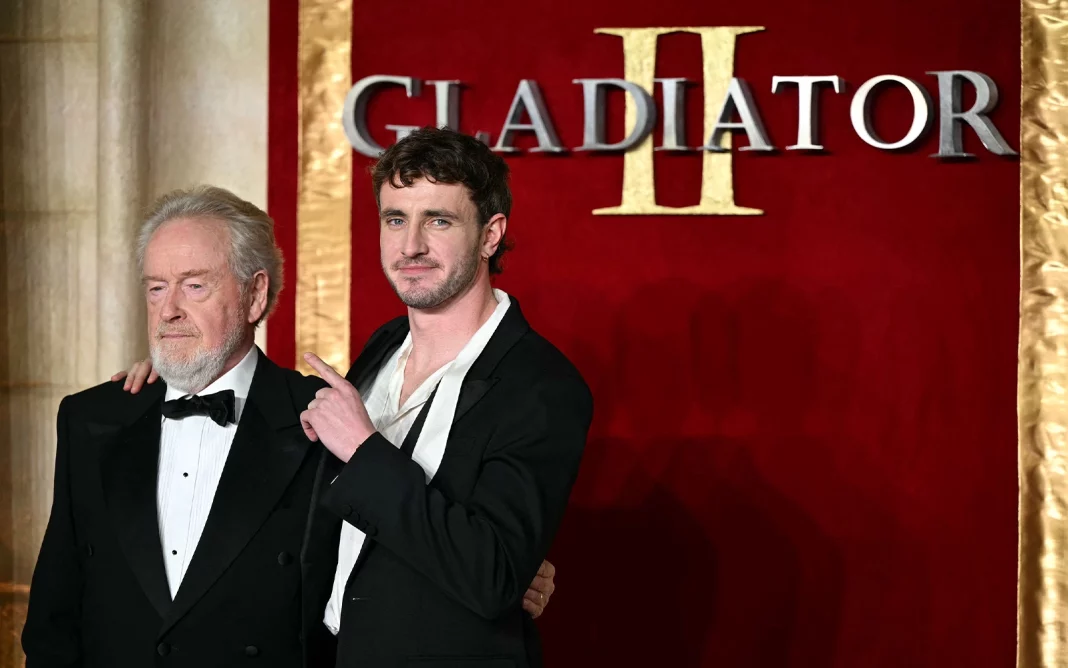With Gladiator II, Ridley Scott returns to the streets of imperial Rome not in triumph, but to decidedly muted applause. Despite earning the director a record breaking box-office opening, the film is of such varying quality as to fall well short of the anticipatory hype. Most viewers will happily concede the creative licence to garble the historical intricacies of the story being told; audiences are less likely to suspend their judgement in the case of contrived narratives, lazy inconsistencies, or the tackiness visually glossing the project.
After a flurry of frenetic brushstrokes offering a refresher of the first film’s events, the audience is introduced to their main protagonist, Hanno (Paul Mescal). In what might have been played for an engaging twist had the game not been explicitly given away from the very first trailer, this Hanno is none other than the Lucius Verus of the earlier film, son of Lucilla (Connie Nielsen) and, it is revealed, Maximus Decimus Meridius (Russell Crowe). Lucius lives in peaceful exile beyond the Roman frontier until his home is sacked by a relentlessly expansionist Roman army and he is thrown into his new life as a gladiator. Proving himself in various arenas with increasingly challenging odds, Lucius reaches the heights of the Colosseum as a favourite of the masses, before finally having the opportunity to direct his vengeance at the imperial government he blames for his woes.
If those plot beats seem familiar, it is for good reason. Whole swathes of this second film feel like a regurgitation of the first. An inability to decide whether it is a direct remake or a continuation of the characters’ stories renders the whole thing somewhat listless. Contrived coincidences drive the narrative, and Mescal’s one-dimensional performance is appropriate for a character reduced to mere plot device. The thoughtful writing of the earlier film is nowhere to be found, with characters inexplicably quoting Latin before promptly translating it into English. The audience is left wondering what these Romans had been speaking prior to that point.
These attempts to imitate a successful predecessor (this time, with more swords and beasts) gives the film the uncanny air of a Marvel movie. Another shared feature is the surprisingly hit-and-miss CGI, cringeworthy at times and certain to date the film. It says much that the score, while effective, is at its emotive best only when sampling Hans Zimmer’s original soundtrack. Compounding this, Scott’s choice to move away from the gritty texture of physical film to digital cinematography renders the world in a colourful but artificial veneer. Surely recognising the inevitable comparisons with its precursor, Scott has done nothing to enable his latest project to stand confidently in its own right.
With all this said, the film has an impressive command of scale, and the costume and set design are a feast for the eyes. Though playing fast and loose with the reigns of the emperors involved, there is a very real flavour of ancient Rome here; a sympathetic reckoning with imperial conquest’s aftermath outside the walls of a captured city is a standout moment of grounding. Even the most bitter critic will struggle not to enjoy the many well choreographed fight-scenes or the rich depth added by the performances of Joseph Quinn, Connie Nielsen, and Denzel Washington. It is largely through the latter’s deliciously charming Macrinus that political themes pertinent for today are explored. The answers to the questions raised are less satisfying, with an uncomfortably eugenicist logic countering ‘might makes right’ with the bizarre ‘proper breeding makes right’. Meanwhile, the depravity of Geta and Caracalla can be physically identified by the mere dint of their grotesque makeup and sallow, pockmarked skin.
The film, comfortably revelling in its own visual splendour, is without doubt a romp. Fun so long as it lasts, pull too hard at the narrative threads on reflection and it may start to unravel. Like its timeless precursor, Gladiator II presents and challenges a ‘Dream that was Rome’; unfortunately for Scott, the film’s most dreamlike quality is probably how easily it will be forgotten.


